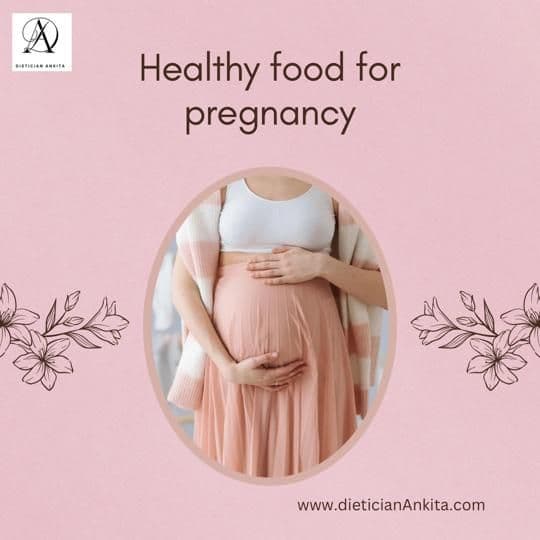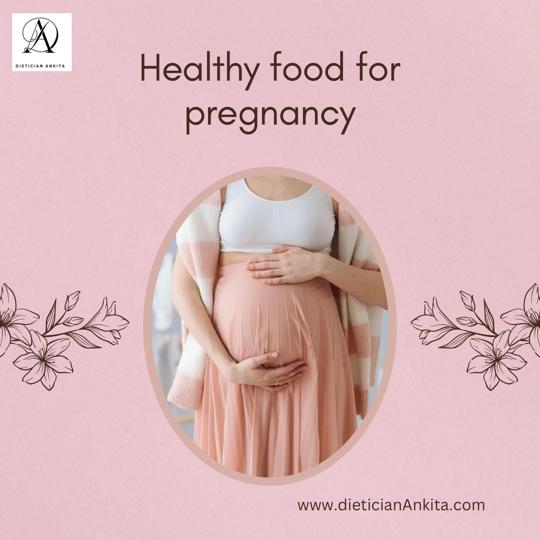
Healthy Food for Pregnancy
Eating a well-balanced and nutritious diet is crucial during pregnancy to support foetal growth and development. Some healthy foods for pregnancy include Dairy products, Legumes, Sweet potatoes, and Salmon. A healthy diet for pregnancy is important not only for the health of the mother but also for the growth and development of the foetus.

It is essential to consume a well-balanced diet that provides all the necessary nutrients and minerals required during this crucial phase of life. A healthy diet for pregnancy should include a variety of foods that offer protein, carbohydrates, fats, vitamins, and minerals.
Eat a variety of foods: Include a variety of fruits, vegetables, whole grains, lean proteins, and healthy fats in your diet to ensure you are getting all the necessary nutrients.
Increase your intake of certain nutrients: During pregnancy, your body needs more of certain nutrients, such as folic acid, iron, and calcium.
Avoid certain foods: Certain foods should be avoided during pregnancy, such as raw or undercooked meat and seafood, unpasteurized dairy products, and deli meats.
Limit caffeine and alcohol: It is recommended to limit caffeine intake to 200mg per day and to avoid alcohol altogether during pregnancy.
Eat small, frequent meals: Eating small, frequent meals can help to prevent nausea and heartburn, which are common during pregnancy.
Stay hydrated: Drink plenty of water throughout the day to stay hydrated.
It is important to talk to your healthcare provider about your specific nutritional needs during pregnancy, as they may vary based on your individual circumstances.
Foods to eat in pregnancy
It's important to eat a healthy diet for pregnancy to support the growth and development of the foetus. Here are some foods that are recommended to eat during pregnancy:
Fruits and Vegetables: These are important sources of vitamins, minerals, and fibre. Aim for a variety of colours to ensure a good balance of nutrients.
Whole grains: Whole grain breads, pasta, and cereals are high in fibre and important nutrients like iron, folate, and B vitamins.
Lean protein: Choose lean cuts of meat, poultry, and fish, along with eggs, beans, and nuts. These provide essential amino acids for foetal development.
Dairy products: Dairy products like milk, yoghurt, and cheese are rich in calcium and vitamin D, which are important for bone development in the foetus.
Iron-rich foods: During pregnancy, the body needs extra iron to support the increased blood volume. Good sources of iron include red meat, poultry, fish, beans, lentils, and fortified cereals.
Healthy fats: Omega-3 fatty acids are important for foetal brain development. Good sources include fatty fish like salmon, nuts, seeds, and avocado.
It's also important to avoid certain foods during pregnancy, such as raw or undercooked meat, fish, or eggs, unpasteurized dairy products, and processed or high-fat foods. Consult with a healthcare provider for personalised recommendations on nutrition during pregnancy.
Foods to avoid in pregnancy
Here are some of the foods to avoid during pregnancy based on medical advice:
Raw or undercooked meats: such as beef, poultry, and fish. They can contain harmful bacteria and parasites that can harm the developing foetus.
Raw eggs: they can be contaminated with salmonella, which can cause food poisoning.
Deli meat: it can contain listeria, a bacteria that can cause miscarriage or stillbirth.
Certain types of fish: such as shark, swordfish, king mackerel, and tilefish, which can contain high levels of mercury.
Unpasteurized dairy products: such as raw milk, cheese made from raw milk, and unpasteurized juices. They can contain harmful bacteria and parasites.
Caffeine: excessive consumption of caffeine can increase the risk of miscarriage and low birth weight.
Alcohol: it can cause foetal alcohol syndrome, a condition that can lead to physical and mental abnormalities in the baby.
Appreciate the creator